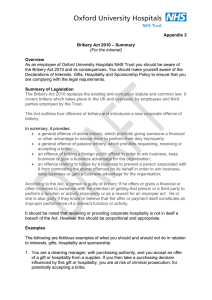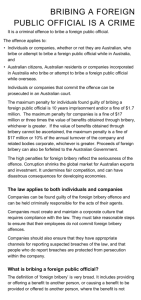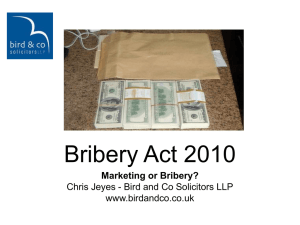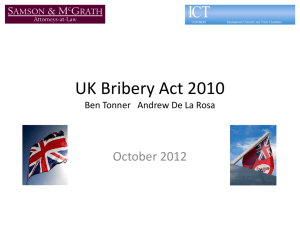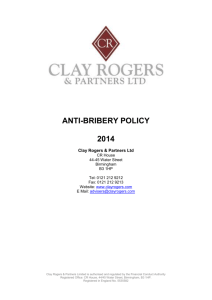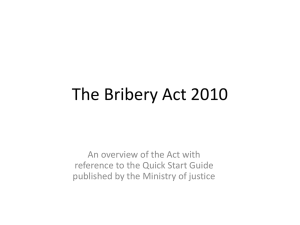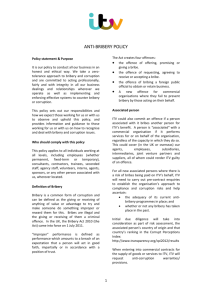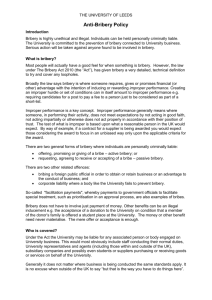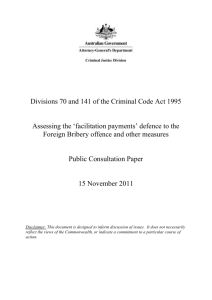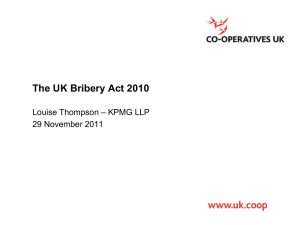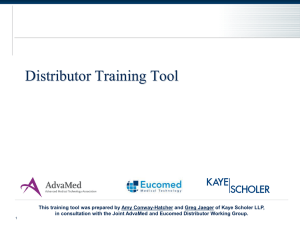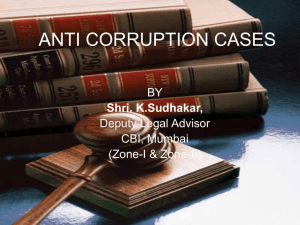Powerpoint Presentation
advertisement
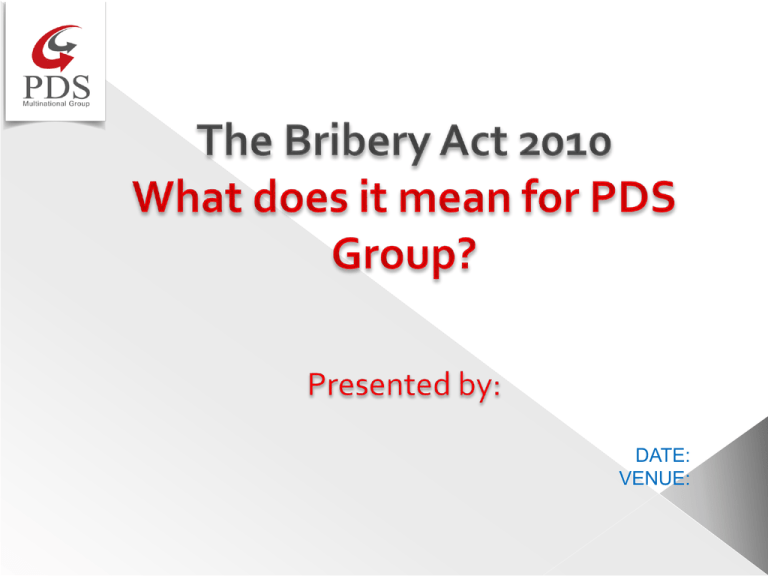
DATE: VENUE: Scope of this session: How Does “the Bribery Act 2010” concern us. • Bribery an offence and its category in the Act • Who is Associated. • Action by PDS to mitigate the Risk. • Penalties & Sanctions under the Act. • Are Gifts allowed? • Are Corporate Hospitality and Facilitation Payments Bribe? • Do’s and Don’ts. • Q&A • PDS Group has companies like Poeticgem, FX, Poetic Knitwear incorporated in UK. The Act extends to apply to the subsidiary, holding, associate, all employees, business partners etc. Affects public and private sector dealings. Affects small and large businesses. Affects customer relationships for something done anywhere on planet Earth. Even affects customers for things done on their behalf without their knowledge. Only limited defences apply. Bribery law changed in the UK on 1 July 2011. Active offence: promising or offering a bribe (section 1). Passive offence: receiving or accepting a bribe (section 2). A bribe is a financial or other advantage offered, promised or given to induce another person: • to perform improperly a relevant function or activity; or • to reward someone for improper performance of a relevant function or activity; or • Knows or believes that the acceptance of the advantage would constitute the improper performance of a relevant function or activity. The receiver requests, agrees to receive or accepts a financial or other advantage and: • Intends that a relevant function or activity is performed improperly (by anyone); or • That is a reward for improper performance of a relevant function or activity (by anyone); or • That request, agreement or receipt constitutes improper performance of a relevant function or activity; or • In anticipation, a relevant function or activity is performed improperly by him or by someone with his assent or acquiescence. • • • Irrelevant whether person benefiting from the bribe is the same as or different from the person performing the function or activity. Bribe can be given/ taken directly or indirectly through a third party. Offence can apply regardless of whether receiver knows or believes the performance of the function or activity is improper. Offence of bribing a foreign public official (section 6). The corporate offence: failure to prevent bribery (section 7). • • • • This offence is committed where a person offers, promises or gives a financial or other advantage to a foreign public official or someone with that official’s consent with the intention of influencing the official in the performance of his or her official duties. A “foreign public official” includes any person, whether elected or appointed, who performs public functions in any branch of foreign national, local or municipal government (whether in a legislative, administrative or judicial role). A “foreign public official” would also include persons working for international organisations such as the World Bank. • • • A commercial organisation is guilty of an offence if someone “Associated” with it bribes another person intending to obtain or retain a business or advantage for it. It is a defence to show that the business had in place “adequate procedures” designed to prevent persons associated with the business from undertaking such conduct. Can apply to businesses located or incorporated anywhere if they do some business in UK, even if bribe occurred outside of UK. Responsibility for bribes made on business’s behalf. Any of the following shall be considered as Associated with the relevant commercial organisation • Someone performing services on behalf of it, in any capacity. • Act says it may, for example, be an employee, agent or subsidiary. • Whether someone is providing services on its behalf is determined by reference to all relevant circumstances. • An employee is presumed to be providing services on its behalf. • It could include joint venture partners, subcontractors, suppliers, other service providers. • It is unlikely to include someone merely supplying goods. • In a contract chain, likely to be responsible not only for bribery procedures with immediate person in chain, but require them to do the same down the chain. • liability doesn’t arise merely through corporate ownership. UK parent not liable just due to getting dividend from subsidiary that had paid bribe. • • • • Unlimited fines. Individuals on indictment can be jailed for up to 10 years. Confiscation of property of criminal conduct. Any senior officer of a company is also guilty if the section 1/2/6 offence is committed with their consent or connivance. • Senior officer would, for example, be a director, secretary or manager. • Debarment from participation in certain public sector contract tenders. Civil claim? • Remedies for losing out to a bribe: • • • Civil claim? Report to Serious Fraud Office. PDS is actively taking following actions to Mitigate the Risk: • Anti-Bribery clauses have been introduced in the Code of Conduct for employees and suppliers. • Suitable training is being imparted to all the employees and communicated to suppliers. • Navex Hotline has been introduced to report violations including bribery. • A complete compliance mechanism has been set-up to avert such risk and senior Industry experts are involved to manage the same. • Employees and Suppliers have been warned of serious action including cancelling of contract if found guilty of Bribery and such other offence • Suitable clause has been introduced in agreement for vendors to abide by the Code which includes Anti-bribery clause. • The limit of taking or paying gift has been clarified to the Employees Taking and giving gifts on appropriate occasions are not absolutely prohibited. However, it is suggested to AVOID it. If at all it is required to be taken or given, please follow the following guidelines: • Maximum Value of Gift: USD 25. However, even if the gift is of less than USD 25, but it has ability to influence the person in violation of applicable law, then it is completely prohibited. • How should be given or accepted: It ishould be given openly and not in closed or covered kind of environment which would uselessly raise doubt on the receiver and provider. • When: The gift must be taken or given on usual customary circumstances and not generally. Such as New Year, any important festival, Supplier meet; etc. • Approvals : If the Gift for any specific person is required to be of value more than the limits prescribed, appropriate approval must be taken in advance from the Vice Chairman. • Disclosures: If for any compelling reason you have accepted a gift of value more than USD 25, disclose it immediately to your CEO and Compliance Head. Also submit it with Company HR until permitted by CEO to use it Corporate Hospitality: It includes matters such as hosting an event for customers at a hotel with a view to forging better relations or hosting the successful completion of a transaction with customers etc . Is it Prohibited? No not absolutely prohibited. But, the following tests must be cleared before providing the same: • Does it commensurate with that provided by others? • Is it beyond what might be reasonably expected generally within the sector? • Is this likely to have a bearing on decision making bona fide – genuinely done or false entry Proportionate – societal status, circumstance etc. Promotional – product promotion or advertising • Is the provision of hospitality to provide an advantage, and given with the intention of inducing a person to perform a relevant function improperly or knowing that acceptance of that advantage is itself improper performance? Facilitation Payment: It includes payments for routine functions to facilitate or speed up bureaucratic functions that officials are otherwise obligated to perform FACILITATION PAYMENTS ARE ABSOLUTELY PROHIBITED. DO’s: • Please update yourself regularly on the Code and Policies of the Companies on relevant matters. • Discuss with your reporting manager/ Compliance Manager (preferably in writing), in case of any doubt or clarification is required. • Inform your customer/supplier about the Policy of the company while avoiding to take gift. • Disclose the gift with complete details if such gifts have been taken or given of value more than the limits prescribed. Preferably submit it to HR of the Company. Don’ts • • • • Do not pay or take bribe in any circumstance. Avoid taking or giving gifts. Do not give or take gift in violation of the company Policy/ Code. Do not enter into any transaction which may lead to bribing directly or indirectly even if you are not directly part of it. • Do not indulge in any kind of facilitation payments. Q & A….open
